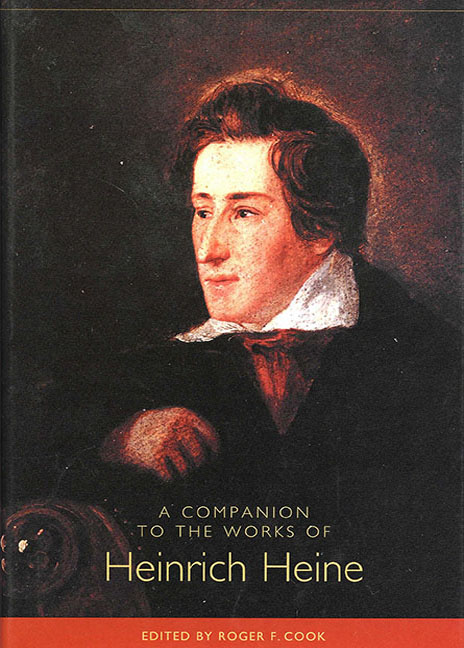Book contents
- Frontmatter
- Contents
- Acknowledgments
- Chronology of Heine's Life
- Heine's Major Works
- List of Abbreviations
- Introduction
- The Romantic Poet
- Philosophy, History, Mythology
- Nightingales Instead of Owls: Heine's Joyous Philosophy
- Eternal Return or Indiscernible Progress? Heine's Conception of History after 1848
- Heinrich Heine and the Discourse of Mythology
- Religion, Assimilation, and Jewish Culture
- Modernity: Views from the Poet's Crypt
- Reception in Germany
- Notes on the Contributors
- Index
Heinrich Heine and the Discourse of Mythology
from Philosophy, History, Mythology
Published online by Cambridge University Press: 29 July 2017
- Frontmatter
- Contents
- Acknowledgments
- Chronology of Heine's Life
- Heine's Major Works
- List of Abbreviations
- Introduction
- The Romantic Poet
- Philosophy, History, Mythology
- Nightingales Instead of Owls: Heine's Joyous Philosophy
- Eternal Return or Indiscernible Progress? Heine's Conception of History after 1848
- Heinrich Heine and the Discourse of Mythology
- Religion, Assimilation, and Jewish Culture
- Modernity: Views from the Poet's Crypt
- Reception in Germany
- Notes on the Contributors
- Index
Summary
Auch in der Mythologie ging es gut. Ich hatte meine liebe Freude an dem Göttergesindel, das so lustig nackt die Welt regierte. Ich glaube nicht, daß jemals ein Schulknabe im alten Rom die Hauptartikel seines Katechismus, z.B. die Liebschaften der Venus, besser auswendig gelernt hat, als ich.
— Heinrich Heine, Ideen. Das Buch Le Grand (DHA 6: 189)Es war im May 1848, an dem Tage, wo ich zum letzten Male ausging, als ich Abschied nahm von den holden Idolen, die ich angebetet in den Zeiten meines Glücks. Nur mit Mühe schleppte ich mich bis zum Louvre, und ich brach fast zusammen, als ich in den erhabenen Saal trat, wo die hochgebenedeite Göttin der Schönheit, Unsere liebe Frau von Milo, auf ihrem Postamente steht. Zu ihren Füßen lag ich lange und ich weinte so heftig, daß sich dessen ein Stein erbarmen mußte. Auch schaute die Göttin mitleidig auf mich herab, doch zugleich so trostlos als wollte sie sagen: siehst du denn nicht, daß ich keine Arme habe und also nicht helfen kann?
— “Nachwort” zu Romanzero (DHA 3.1: 181)Thus Heine represents his renunciation of the Greek mythological figures that pervade his writings from the early poem “Die Götter Griechenlands” through the expository works Zur Geschichte der Religion und Philosophie in Deutschland and Elementargeister to the ballet libretto Die Göttin Diana, which he wrote shortly before the revolutionary tumult of 1848. The account is fictional, of course. It is hard to image that Heine ever lay prostrate in the Louvre. And it is even harder to imagine that Heine actually lay prostrate in the Louvre in front of a famous statue of Venus the very last time he went out before an eight-year long confinement, the “Matratzengruft” period, during which he in fact turned his attention away from Venus and the other Greek gods. Of course, Heine did not abandon the gods completely. In an enigmatic late story, Die Götter im Exil, he appropriated them as he had throughout his oeuvre: as ciphers for a “Hellenic” sensualism forced underground by “Nazarene” spiritualism. The text is cryptic because, unlike Elementargeister, to cite just one example, it portrays the Greek gods not simply as exiled, but also as old, worn and, in some cases, complicit with the very spiritualist order that oppresses them.
- Type
- Chapter
- Information
- A Companion to the Works of Heinrich Heine , pp. 201 - 226Publisher: Boydell & BrewerPrint publication year: 2002

